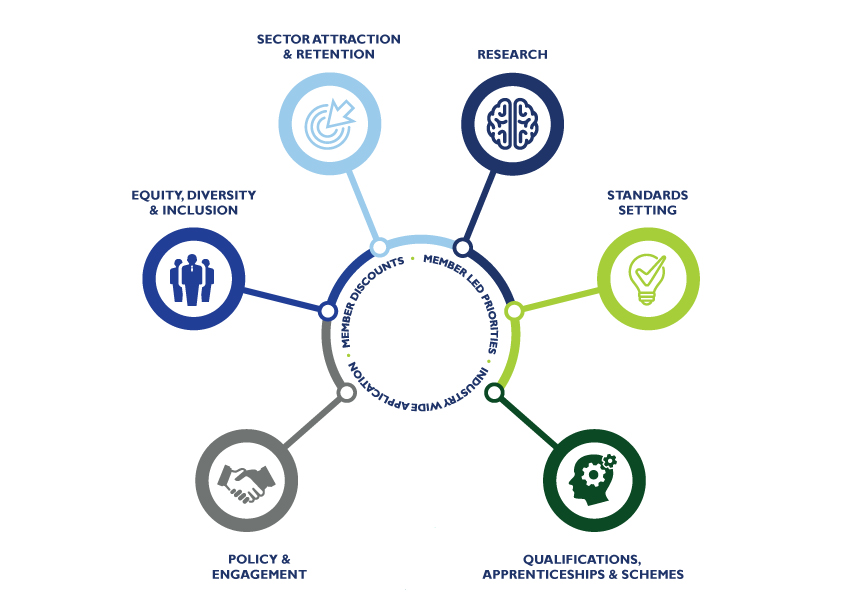Membership
Our members collaborate across the energy and utilities industries to set industry standards, drive best practice and innovate to meet existing and future skills needs and emerging green priorities. As specialists, we work with industry and government to define skills needs and the impact of the greener economy, providing an authoritative skills voice.
Energy & Utility Skills Membership
As a member of Energy & Utility Skills, you secure a seat at the table that leads on sector wide collaboration to deliver a safe, skilled and sustainable workforce.
Membership with Energy & Utility Skills convenes the sector and industries to enable collaboration to set Industry standards, drive best practice and innovate to meet existing & future skills needs and emerging green priorities. As skills and workforce specialists, we work with industry & government to define skills needs and the impact of the greener economy, providing an authoritative skills voice.
Our Membership proposition represents elements of how we deliver key outputs that support our vision and mission. Leading the collaboration on each aspect, we ensure that your voice is at the heart of what we do, delivering targeted activity that gets results.
Membership Framework
As the only independent skills body representing all of utilities – we work cross-industry from gas and power to water and waste, across each of the UK’s four nations – we’re perfectly positioned to drive real, long-lasting change across the sector.


Membership Priorities
Our Skills Strategy 2025 – 2030 has been shaped by our members, informed by our unique data and expertise, and approved by our CEO Council and is a shared vision for the sector’s future workforce is built on four strategic pillars: Research, Attract, Develop and Retain.
These pillars will guide our collective efforts through to 2030 and ensure the sector has the safe, skilled and sustainable workforce needed to keep our country running today and, above all, provide the skills to deliver the UK’s future.
Over the past strategic period, we outlined three key areas of which we’ve contributed significant progress:
- Social Impact
- Competencies and Skills
- Workforce Resilience
Social Impact:
ED&I
Energy & Utilities Skills Partnership now has 55 sector organisations signed up to The Inclusion Commitment and its’ five principles supporting equity, diversity, and inclusion.
Sector Attraction and Retention
Recruitment, retention and progression within the industry remains a priority. Through our sector attraction strategy, we ensure that targeted action is taken to address national and regional demands.
Competencies and Skills
Recognising the critical nature of industry competencies and skills, the development and delivery of this work is carried out through a series of strategic structures and groups:
The National Skills Academy for Power (NSAP): Including power generation (wind, solar, thermal), transmission and distribution, smart metering and the decarbonisation of power generation. Prioritisation of carbon capture remains a key priority, as an enabling technology.
The National Skills Academy for Gas (NSAG): Supporting current operations across the gas networks and the transition to hydrogen, should government give the green light for the next phase of this rollout.
The Water Industry Competencies and Skills Steering Group: Delivering the changes required across the water industry including understanding the skills challenges for the upcoming asset management period (AMP8).
These groups ensure that the appropriate knowledge and skills are shared in the development of schemes, qualifications and apprenticeship standards.
Workforce Resilience
Awareness and understanding the size and scale of the challenge ahead, to include engagement with government, devolved administrations and regulators to agree subsequent actions:
Workforce analysis and resilience metrics: These metrics help employers and the industry assess workforce resilience to skills and labor market challenges. They cover workforce characteristics, skills development, and attraction and retention. An annual analysis, supported by Ofgem, benchmarks workforces against regional, national, and cross-sector averages.
Industry-based analysis of online job postings: Annual reports analyse online job postings using Lightcast data, covering industry-specific volumes, skill trends, vacancy locations, top recruiters, and salaries. Reports are produced for Gas Networks, Power, Waste & Recycling, Water, Apprenticeships, Green Skills, IT & Data, and Nations & Regions.
Sector workforce demand estimates: Launched at our October 2024 conference, these reports provide workforce demand estimates for the energy and utilities sector, covering Gas Networks, Gas Utilisation, Power, Waste & Recycling, and Water. They include current employment levels, 2030 forecasts, job growth, and new workforce requirements, detailed across 19 occupational groups.
Infrastructure-wide workforce demand estimates: In collaboration with members and skills bodies like CITB, ECITB, and others, we produce outputs detailing the workforce needs of the wider infrastructure construction sector, contextualising energy and utilities demands within broader competition for skills across adjacent sectors.
Benefits of Membership
Joining Energy & Utility Skills connects your organisation to a dynamic network of industry leaders working together to shape the future of the energy, water, and waste sectors. From influencing national skills policy and driving inclusive workforce strategies to setting industry standards and tackling the green skills challenge, membership ensures your voice is heard and your impact is felt. Explore how being part of this collective unlocks opportunities to collaborate, innovate, and lead on the issues that matter most.
Our Members
We have over 70 Members who represent a strategically important cross-section of the UK’s utilities, infrastructure, and energy sectors, and are essential to the UK’s energy security, environmental sustainability, and infrastructure resilience.
Members Testimonials
“…leading authority on sector skills needs and government policy…”
“…I find working with Energy & Utility Skills invaluable…”
“…ensuring that our initiatives are not only effective but also equitable and inclusive…”
See what some of our members say about working with us.
Ask us about becoming a member
To find out more about becoming a member, please fill contact us and a member of our team will be in touch.
"*" indicates required fields
